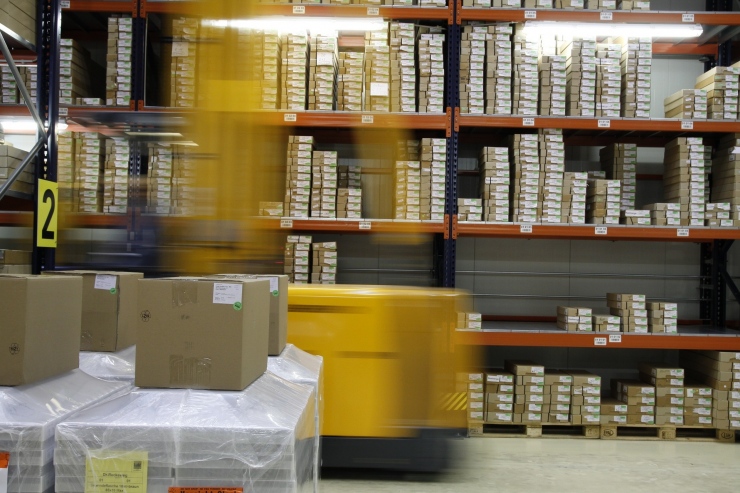One of the best indicators of just how important warehouse management is for a 21st-century business could be seen when Amazon purchased Kiva Systems for the incredible $775 million dollars in order to robotize their warehouses. For a small business, this probably wouldn’t be a viable option, but you don’t have to purchase a robotics manufacturer in order to grow your warehouse system/business and make it more efficient. With that in mind and without further ado, here are five factors that can help you with this task, as well as some tips and suggestions on how to improve in all of these fields.
1. Hiring the right team
Having an adequate team on your side is something that will affect not just the efficiency of your business but also the rate of injuries and accidents. The first thing you need to do is check their previous injury record and their previous employment record. While this is not 100 percent reliable, it is definitely something that can help you get a good idea of just who you’re hiring. Ideally, you would hire people from within the warehouse industry. Still, sometimes, you might be forced to hire laymen and train them yourself. Speaking of which…
2. Training and mentoring program
One of the things you can do to ensure your team is efficient (after hiring them) is to make sure that they undergo proper training. Ideally, you would have a member of your own staff (a more experienced colleague) instruct them, thus, creating a mentoring program. This way you get to use the experience that has amassed over the course of time (use experience as an asset) and have the knowledge come to your staff from a person of authority. Sure, you need to pre-write this curriculum of yours in order to ensure that all the key points are at least touched upon.
3. Safety regulation
Making a safety statement is incredibly important for a warehouse business, due to the fact that, for the most part, this can be considered an industry with a high risk of injury. This can mean a number of things but the most important part of it all is that you describe (in detail) step-by-step conduct when handling warehouse materials. This is something that will give your team a chance of avoiding the majority of injuries, as well as provide you with a certain degree of legal insulation.
4. Label everything
The way in which this principle helps you navigate your warehouse is quite obvious, yet, this is a method that not enough warehouse managers apply. First of all, labeling boxes will help your staff know what’s inside without having to peak into them. This is handy especially if these boxes are in hard-to-reach spots. Also, if the material inside is delicate, it gives your staff a chance to know how to approach them, without having to figure it out through an expensive trial and error process.
5. Proper material handling equipment
Sometimes, properly handling materials is impossible without adequate equipment like trolleys and forklifts. This means that you need to find a reliable forklift supplier company to team up with. This, nonetheless, is not the end of your troubles. You must first train your team to handle this equipment, as well as instruct them on the safest way to use them. A person operating a forklift or a trolley needs to know fully well the maximum capacity (better yet, recommended maximum capacity) of the equipment in order not to overburden it. Otherwise, you risk damaging equipment, damaging material and causing an injury in the process. All three of this can pose a serious problem for your warehouse business, especially if they keep repeating time after time.
6. Make a proper layout plan
The position of each item in your warehouse will determine its efficiency, which is why you need to entrust this task to someone who knows what they’re doing. Most requested items need to be the easiest ones to fetch, while those that anyone seldom ever asks for can be placed in the furthest corners of the warehouse. Keep in mind, nonetheless, that there’s a lot more to warehouse management than adhering to these two simple principles. Some items need specific conditions in which they can be held (hazardous materials, fragile items or perishables). It is your duty to make sure that these conditions are met at all times.
7. Acquire adequate warehouse management software
In one of the previous sections, we’ve mentioned the importance of getting the right warehouse management hardware, well, the software can be just as important. You see with the right warehouse management software, you can drastically increase the efficiency of your warehouse manager, manage your inventory with greater efficiency and reduce the probability of employee theft. Overall, this is a powerful platform that can completely change your approach to this industry as a whole.
8. Keep all the traffic areas clear
Just because your staff isn’t that large, doesn’t mean that there won’t be a massive traffic jam in your warehouse every now and then. People who think this often underestimate just how tight the “hallways” are and just how much space does the handled material takes. This is why you might want to keep the shelves and racks a tad further apart (even if you lose some warehouse space due to this practice). Creating a system where arrows are pointing one in the direction of their optimal route is a simple, yet, effective solution.
9. Communication, communication, communication
The next thing you need to understand is that you should never underestimate the amount of in-depth knowledge that each of your employees has of their field. Therefore, you always need to be on the lookout for potential issues and ask them to share their concerns. There are some issues that are impossible to predict theoretically but are quite evident to those who are handling the equipment on a daily basis. The sooner you get informed of these issues, the sooner you can start solving them. Also, you need to establish a proper (formal) channel of communication and a problem-solving system to deal with these issues as soon as possible.
10. Optimize your stock layout
Finally, an efficient warehouse manager is the one who can always predict which items are in the greatest demand or will be so in the nearest future and get a healthy stock. This is why the bulk of warehouse management work is predictive, which is where the above-discussed warehouse management software might be of great assistance. Even in the warehouse business, the issue of the cash flow will be a major determiner when it comes to your success. Therefore, ordering a bulk of supplies that aren’t in a great demand might deplete your cash reserves, thus leaving you in a troublesome situation.
In conclusion
Finally, you need to understand that every day of procrastination results in an unnecessary loss of effort and resources. This is why you need to start acting right away. Also, you need to understand that your warehouse business isn’t the only link in the chain, which is why there are some instances where things are just not up to you. The efficiency of your fleet, the reliability of your suppliers and customers, as well as the ability of your sales team, will be the factors that determine how your warehouses will be used and with what frequency. In order for your business to perform admirably, all of these areas need to work both individually and together as smaller parts of a larger whole.


























Add comment